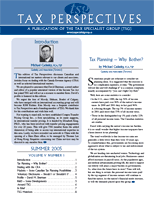
PDF Format
 Issue Contents Issue Contents
 All Issues All Issues
Summer 2005
Volume 5, Number 1
The information in Tax Perspectives is prepared for general interest only. Every effort has been made to ensure that the contents are accurate. However, professional advice should always be obtained before acting and TSG member firms cannot assume any liability for persons who act on the basis of information contained herein without professional advice.
In Brief
By Howard L. Wasserman, CA, CFP, TEP
Cadesky and Associates LLP (Toronto)
FIE — Non-Resident Trust Rules The long awaited legislation on Foreign Investment Entities ("FIEs") and Non-Resident Trusts was released on July 18, 2005. It is to apply retroactive to January 1, 2003. The rules are similar to the previous version released in 2003, but do differ in certain important aspects. For example, payments from a non-resident trust which is deemed Canadian resident, may be subject to withholding tax when made to a non-resident. There are also exceptions and transitional rules. All situations involvong non-resident trusts and FIEs must now be reviewed under this new legislation, which we believe is likely to be the final version. With the rules applying retroactive to 2003, practical difficulties will arise.For example, does one amend previous tax returns or leave them alone? The FIE rules give rise to a great deal of complexity, especially in obtaining the necessary information to comply with these rules. Basically, all non-resident investment funds will need analysis to see if income is to be reported under the FIE rules. We will be preparing an analysis of these rules for the next Tax Perspectives. The rules were first unveiled in February, 1999, and the delay in enacting the legislation is unprecedented. One observer remarked that the Great Wall of China was built in less time. New Loss & Interest Deductibility Rules On October 31, 2003, the Department of Finance issued draft proposals on the deductibility of expenses, which affect the ability of all taxpayers to claim losses. These rules were to apply starting January 1, 2005. Following an outcry about the proposed rules, government officials stated that they are reviewing the rules and there could be major changes. At the date of this publication, nothing further has been proposed. Under these rules, a taxpayer can claim a loss only if, in the year, it is reasonable to conclude that there will be a cumulative profit from the business or property. This will require an annual evaluation to determine in each year if a loss can be claimed. There is no grandfathering of these rules, which means that there may be situations from January 1, 2005 where losses that were previously deductible will not be allowed. Currently, losses are deductible as long as there is a source of income. There is no need for there to be net income. These new rules, if enacted, will significantly change the deductibility of losses. The proposals are problematic for many reasons and will create controversy and litigation. Taxpayers will not easily agree that their tax losses are non-deductible. Affiliated Persons On September 16, 2004, the Department of Finance issued new rules on the definition of "affiliated persons." These rules are important with regard to the denial of losses on transactions between affiliated persons. In the past, trusts were not affiliated to persons. Under the proposed rules, a person and a trust may be affiliated if that person or a spouse is a discretionary beneficiary of the trust. This means that, for example, if an individual transfers an asset with an accrued loss to a trust, and the beneficiaries of the trust include the individual and/or a spouse, then the loss is denied. There are additional rules when the trust is non-discretionary. In the latter case, a person and a trust would be affiliated where the person and/or affiliated persons are entitled to 50% or more of the income or capital of the trust. These rules will apply to any transactions that occurred after March 22, 2004. Claiming foreign tax credits Canadian taxpayers may claim a tax credit for foreign taxes paid. A recent case, Meyer (2004 D.T.C. 2393), denied a foreign tax credit where U.S. taxes, which could have been reduced under the Canada-U.S. Tax Treaty, were paid. Based on this case, if foreign taxes may be reduced by a treaty claim or by filing a foreign tax return to obtain a refund, only the smaller amount of tax will be allowed as a credit in Canada.
|